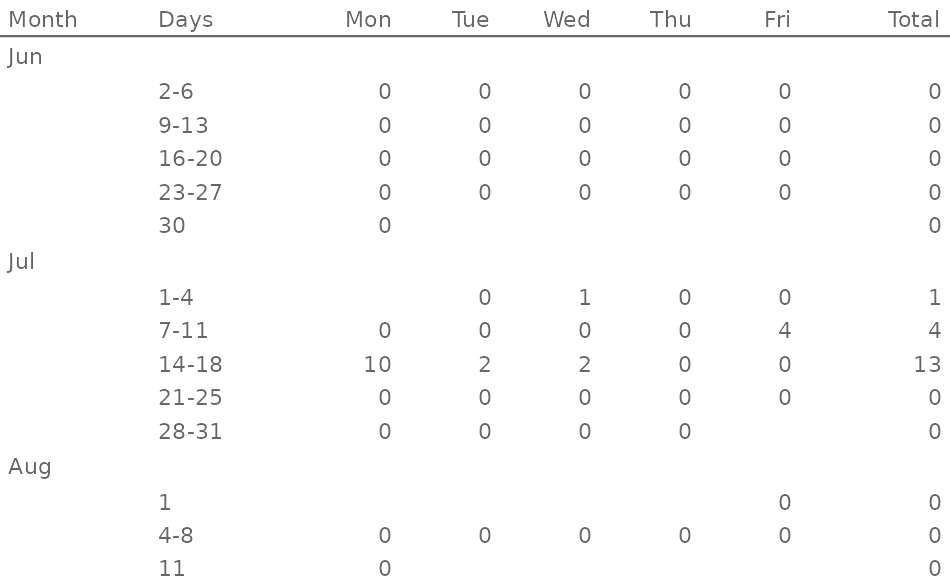Personal package to help me track my tasks. Unlikely to be of value to anyone else.
Installation
You can install the development version of calendario like so:
pak::pak("djnavarro/calendario")Example
Creating a calendar and adding tasks to projects:
library(calendario)
# initialise an empty calendar
cal <- cal_new()
cal
#> <Calendario object [0 projects]>
# this is the verbose way to add a task
cal$add_task(
description = "Miscellaneous domestic tasks",
start = as.Date("2025-07-11"),
stop = as.Date("2025-07-14"),
project = "Housework",
daily_hours = 4,
team = "Danielle"
)
cal
#> <Calendario object [1 project]>
#> • Housework [1 task]
# this is a more convenient way
cal$set_project("Art")
cal$add_task("Finish writing the system", "14 jul", total_hours = 4)
cal$add_task("Publish the code", "14 jul", "16 jul", total_hours = 5)
cal
#> <Calendario object [2 projects]>
#> • Art [2 tasks]
#> • Housework [1 task]
# piping is also supported
cal |>
cal_set_project("Writing") |>
cal_add_task("First blog post", "2 jul") |>
cal_add_task("Second blog post", "13 jul")
cal
#> <Calendario object [3 projects]>
#> • Art [2 tasks]
#> • Housework [1 task]
#> • Writing [2 tasks]Viewing tasks, projects, and monthly calendars at the R console:
# one row per task, all details shown
cal$get_tasks()
#> # A tibble: 5 × 9
#> project type description start stop days daily_hours total_hours
#> <chr> <chr> <chr> <date> <date> <int> <dbl> <dbl>
#> 1 Housew… <NA> Miscellane… 2025-07-11 2025-07-14 2 4 8
#> 2 Art <NA> Finish wri… 2025-07-14 2025-07-14 1 4 4
#> 3 Art <NA> Publish th… 2025-07-14 2025-07-16 3 1.67 5
#> 4 Writing <NA> First blog… 2025-07-02 2025-07-02 1 1 1
#> 5 Writing <NA> Second blo… 2025-07-13 2025-07-13 0 1 1
#> # ℹ 1 more variable: team <chr>
# one tibble per month, counts daily hours
cal$get_calendar("1 jun", "11 aug")
#> [[1]]
#> # A tibble: 5 × 8
#> Month Days Mon Tue Wed Thu Fri Total
#> <ord> <chr> <dbl> <dbl> <dbl> <dbl> <dbl> <dbl>
#> 1 Jun 2-6 0 0 0 0 0 0
#> 2 Jun 9-13 0 0 0 0 0 0
#> 3 Jun 16-20 0 0 0 0 0 0
#> 4 Jun 23-27 0 0 0 0 0 0
#> 5 Jun 30 0 NA NA NA NA 0
#>
#> [[2]]
#> # A tibble: 5 × 8
#> Month Days Mon Tue Wed Thu Fri Total
#> <ord> <chr> <dbl> <dbl> <dbl> <dbl> <dbl> <dbl>
#> 1 Jul 1-4 NA 0 1 0 0 1
#> 2 Jul 7-11 0 0 0 0 4 4
#> 3 Jul 14-18 9.67 1.67 1.67 0 0 13
#> 4 Jul 21-25 0 0 0 0 0 0
#> 5 Jul 28-31 0 0 0 0 NA 0
#>
#> [[3]]
#> # A tibble: 3 × 8
#> Month Days Mon Tue Wed Thu Fri Total
#> <ord> <chr> <dbl> <dbl> <dbl> <dbl> <dbl> <dbl>
#> 1 Aug 1 NA NA NA NA 0 0
#> 2 Aug 4-8 0 0 0 0 0 0
#> 3 Aug 11 0 NA NA NA NA 0Creating HTML tables to display the tasks:
cal$show_tasks()
Tasks can be filtered:
cal$show_tasks(project == "Art")
Calendars can also be displayed as HTML tables:
cal$show_calendar("1 jun", "11 aug")